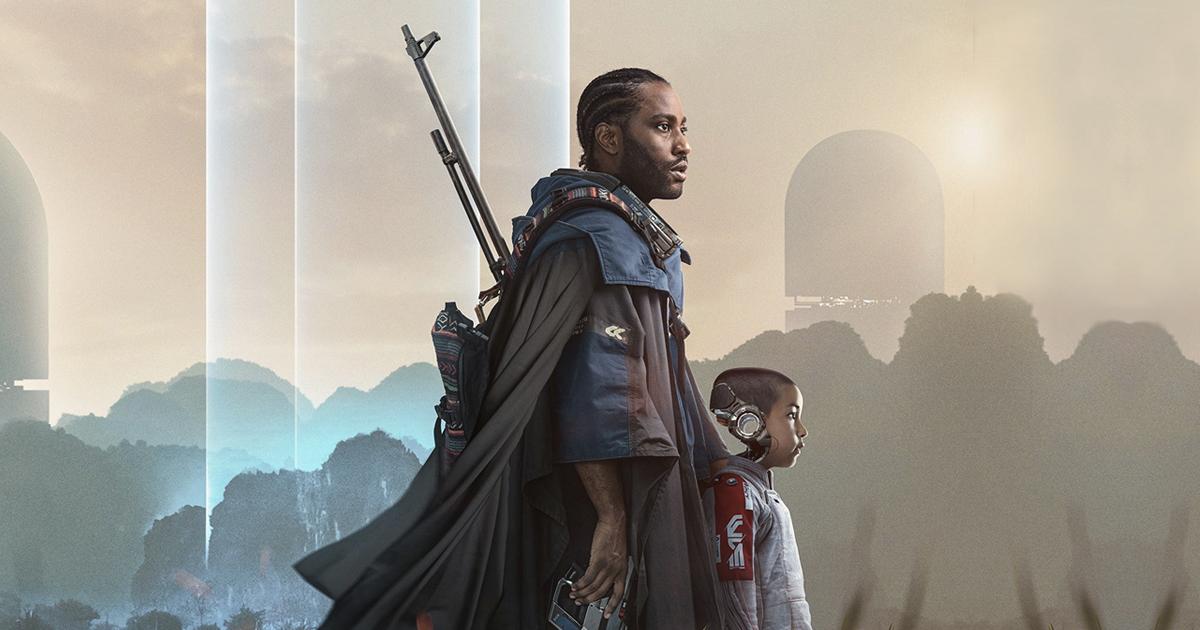When I first saw the trailer for Gareth Edwards’ The Creator, I knew I’d be writing about it in this series. Even in a short preview, themes with spiritual significance were evident—the nature of humanity, creation care, the ethics of artificial intelligence. These are all conversations in which Christians should be participating.
The title alone suggests a parallel to one of the first works of science fiction, Mary Shelley’s Frankenstein, in which the titular doctor “tampers in God’s domain” to create life, with disastrous results. Following the success of Edwards’ previous film, Star Wars: Rogue One (a film many Star Wars fans see as the strongest of the franchise), I was eager to see what Edwards would accomplish with this new vision (potential spoilers follow).
More and more, I find myself returning to science fiction when I want to explore religious themes and examine the intersection of faith and culture. I used to prefer fantasy for that. Historically, Christian scholars have paid greater attention to works of fantasy, notably C.S. Lewis’ world of Narnia, J.R.R. Tolkien’s Middle Earth and the magical world of J.K. Rowling. Even when the authors of such works aren’t explicitly Christian, Christians just seem more comfortable in the fantasy genre.
As Michael Weingrad, a professor of Jewish studies at Portland State University in Oregon, provocatively noted: “Christianity is a fantasy religion … individualistic, magical and salvationist.” Weingrad’s point is that the Christian imagination responds well to stories where magic can and does happen. For those of us who believe in a God of the miraculous, of the divine Word made flesh, the fantasy genre—where the wonderous can happen—offers a comfortable space to explore themes of redemption, salvation and divinity.
Science fiction—or speculative fiction, as it’s sometimes called—hasn’t always enjoyed the same preferred status. With a preoccupation on reality, technology and what might be possible, the science fiction genre hasn’t always had much interest in overt questions of a theological or spiritual nature. Science fiction usually concerns what problems humans are capable of fixing or surviving through technological advancements and their own ingenuity.
Over the past decade, there seems to have been a noticeable shift as more works of speculative fiction are engaging with such topics. While franchises like Star Wars and The Matrix certainly paved the way (and inspired more than a few Sunday school classes and sermons), they were outliers. With films such as Dune and Blade Runner 2049, and shows like Doctor Who, The Mandalorian and Picard (along with the other entries in the Star Wars and Star Trek franchises), the speculative genre has entered a real golden age in terms of quality and sophistication.
In The Creator, Edwards weaves a complex tale of warfare, truth, betrayal, redemption and moral ambiguity. In the dystopian future of 2055, a nuclear warhead detonated by artificial intelligence (AI) over Los Angeles triggers a global conflict between Western nations and AI, with New Asia supporting the latter. U.S. Army sergeant Joshua Taylor is exposed as a covert operative when military forces attack his home, leading to the apparent death of his wife. Five years later, Taylor is recruited to destroy a new AI weapon, “Alpha One,” that threatens humanity. Taylor’s journey explores themes of sacrifice, loss and the blurred lines between humanity and AI in a world divided by war and distrust. The powerful Alpha One weapon is revealed to be a child, whom Taylor chooses to protect and names Alphie.
The Creator raises many themes worth discussing, but the one I keep coming back to is the idea of a child undoing our expectations of power and might. Since the Christmas season we have just celebrated was marked by ongoing military conflicts in Eastern Europe, Israel and other parts of the world, this symbolism seems especially poignant. The contrast between how the characters imagine the weapon, Alpha One, and the reality of the child, Alphie, directly recalls the prophetic tension we see in Scripture between the expected Messiah as a warrior-king coming to smite the enemies of Israel and the innocent child born in Bethlehem in a humble stable.
The comparison is not an exact one. Alphie isn’t supposed to “be” Jesus; Edwards is not telling an allegorical Christian tale, like Lewis in The Chronicles of Narnia. Rather, he employs a metaphor for power that Christians should recognize: the most powerful doesn’t need to be aggressive or dominant. In Jesus’ upside-down kingdom, the last shall be first. In The Creator, Gareth Edwards evokes imagery that should resonate with the Christian imagination, reminding us of the sort of power dynamic that Christ subverted with his birth and teachings.
Dr. Michael Boyce is the director of program implementation at the College for Officer Training in Toronto.
Photo: Courtesy of 20th Century Studios










Leave a Comment